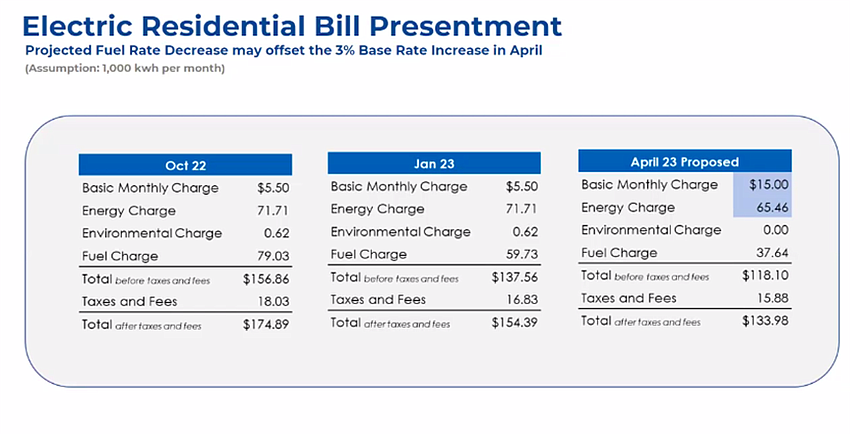
The JEA board of directors approved a $9.50 per month increase to its residential electric basic monthly charge to take effect in April.
The board voted unanimously Feb. 28 to raise the basic monthly charge portion of an average residential bill from $5.50 per month to $15, a 172.72% increase.
That covers customer service-related costs, including billing, call center services and meter reading.
JEA officials say the hike is necessary to reverse a projected fiscal year 2023 revenue shortfall for its electric system.
Despite the increase, the average electric customer could see a smaller bill because of declining fuel costs and a decrease in energy charges.
The city-owned utility conceded Feb. 28 the billing change could translate to a slightly higher bill for lighter electric users.
Including the basic monthly charge increase, JEA estimates an average residential customer using 1,000 kilowatt hours of electricity per month will pay $133.98 in April after taxes and fees.
The latest projection compares with a peak of $174.89 in October 2022.
A chart displayed during the Feb. 28 board meeting shows the reduced energy charge would bill a 1,000-kilowatt user an estimated $65.46 in April 2023 compared to $71.71 in October 2022.

The average fuel charge on a residential customer’s bill in October 2022 was $79.03 compared with an estimated $37.64 in April 2023.
This is a drop from the previous estimate of $44.57 made in November 2022.
JEA customers will still be paying more for fuel than they did in October 2021 when the average fuel charge was $30.50. The average overall customer bill at that time was $123.35.
JEA’s environmental and conservation charges also will be rolled into other fees.
For electric customers who use less than 1,000 kilowatts, JEA CEO Jay Stowe said monthly bills could be $3 to $4 more per month coupled with the fuel charge drop.
“We were thoughtful in how we did it. We were not ignoring those facts,” Stowe said.
These are customers who typically live in small homes or apartments that do not have as much space to heat and cool.

According to Stowe, the basic charge increase gives the utility revenue stability in the long term.
“It is similar to what we did on the water (system) side. We did this years ago and have significantly more stable revenue coming in on water than we do on electric. Water is up and down based on weather. Our costs are generally fixed,” Stowe said.
“This is not accounting standards so much as a recovery of the costs to be able to provide for our customers.”
Public raises concern
The board’s vote came after a public hearing on the rate that brought pushback from JEA customers and some Jacksonville-area activists.
Ben Frazier, president and founder of the Northside Coalition of Jacksonville activist group, told the board Feb. 28 the increase is “a classic example of economic injustice” and an example of “voodoo economics at JEA.”
He said representatives from his nonprofit met with JEA officials but were not able to reach a compromise on a smaller basic charge increase.
Frazier said he wanted the board to vote down the billing proposal.
“So you say JEA is confronted with inflation? Well, guess what, so too are the consumers,” Frazier said.
Revenue-customer balance
A cost-of-service analysis released by JEA shows that the utility’s residential electric system will bring in $438.2 million in fiscal year 2023 — Oct. 1, 2022, to Sept. 30, 2023 — without billing changes. That is $39 million, or 8.2%, below what it needs to be revenue neutral.
Board member Marty Lanahan said the latest base charge increase should be followed by an annual review so future hikes are incremental and manageable for JEA customers and not to address a critical revenue shortfall that has built up over time.
“It is really hard for the consumer to go from a base rate charge to a different rate if we haven’t been increasing it over a period of time. Because it does feel like a big increase. I think the issue is we haven’t reviewed it in a very long time,” Lanahan said.
Stowe said JEA is working with nonprofit groups to help some lower-income customers better insulate their homes to reduce energy consumption.
Lanahan said she was comfortable with the change because it was coming as fuel costs have started to decline.
JEA’s projection that monthly fuel costs will continue to drop through April is based on a trend showing global natural gas prices stabilizing after volatility created by geopolitical events and pandemic-related supply chain distributions.
JEA began varying the fuel charge on a residential customer’s monthly bill last year as spiking natural gas prices began to deplete its stabilization fund, directly passing on the cost of fuel to customers.
If market conditions change and the price for fuel rises, so will JEA electric bills.
During the meeting Feb. 28, board members appeared optimistic about the projected fuel cost trends.
“The hope is this (base charge increase) will not impact the consumer’s pocket,” Lanahan said.